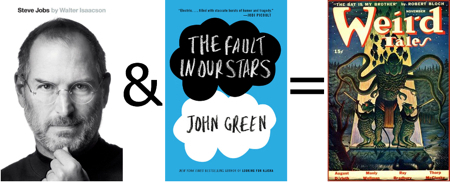Be Weird, & Love a Lot of Things
Do you know what I think allows people to do their best work? Being weird, and loving a lot of things.
More than anything else in my reading life, I adore the feeling of putting down a novel and thinking, Good Lord, nobody else on this planet could have written that book.
Through some incredible combination of craft and passion, my heroes—Cormac McCarthy, Tom Wolfe, John Green, Stephen King, even a man like Steve Jobs—create work as singular as a strand of their DNA.
I think about this so much. More than anything, that feeling—This is the work of a distinct voice—is what I so hope to create for a reader.
I’ve got a theory about how it happens. I think that what these folks do is what most of us spend a lot of our lives shying away from: They allow their whole, weird, one-of-a-kind selves to pour onto their work, and they love a lot of things.
Here’s one of the strange and wonderful secrets of adulthood: A lot of the things that I spent years wishing I could change about my writing have wound up being the things that other people seem to like the most.
That’s the “weirdness” part: the distinct sentence style, the word-personality, that we all call “voice.”
Nobody writes with the pulse of Cormac McCarthy. Nobody else can harness the propulsive beautiful reckless energy of Tom Wolfe, whose work reads like a lightning storm.
There’s no harm in trying, of course: You learn by imitating, and buh-lieve me, I tried to imitate these folks for a long while.
But one of the most important creative (and psychological) realizations I’ve ever experienced is that style can be imitated (usually poorly, admittedly).
But you can’t imitate love.
Here’s what I mean.
When you read John Green’s work, you can see the things he loves: complex thought, “your mom” jokes, religion, bad puns, mathematics. Because of his dedication to craft and his gorgeous style and the care of his editor—but more importantly, his love of a lot of things—Mr. Green’s books glow with intelligence.
Then there’s The Stand. It’s an amazing “yarn”—one of the best American stories of the last century—but it also burns with an attractive anger about the Pandora’s boxes technology continually opens, right? On the other hand, don’t Mr. King’s thoughts on God and destiny soar? That fusion of craft and passion (with only occasional lapses into lecture-i-ness) is why The Stand is my favorite novel of all time.
“To manipulate life, toss the bright-colored orbs up to mix with the dark ones, blending a variation of truths.” — Ray Bradbury
I’m convinced that a big part of why The End Games sold is that I accepted and embraced my own native style, and allowed myself to love what I love, even if I’d never quite seen all those things put together in a book before.
I adore Spielberg-ian action, and well-orchestrated moments of terror, and the diving twists of great thrillers. But I also love being a big brother, and the psychology of flow, and thinking about God. With lots of time and revision, I started to see how all of those things were points of light creating a single constellation. The constellation was my book.

A few of the many “weird” inspirations for THE END GAMES.
So when the writing feels thin, or I’m lost in the plot, I try to grant myself the grace of allowing myself to be odd.
I’m curious about what y’all think. Have you found that embracing your “weirdness” and your loves helps? And do you have any favorite artists who seem to do the same? Let me know in the comments.
About The End Games: You can now pre-order The End Games (Balzer + Bray) at Amazon, Barnes and Noble, and soon on IndieBound. You can also read more about The End Games on Goodreads, or by following me on Twitter and Facebook.
T. Michael Martin's Blog
- T. Michael Martin's profile
- 108 followers




